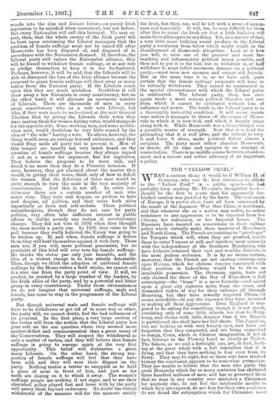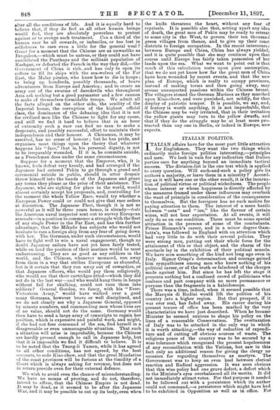THE " YELLOW PERIL" alter all the conditions of life.
And it is equally hard to believe that, if they do feel as all other human beings would feel, they are absolutely powerless to protest against or to avenge such treatment. Can a third of the human race be all cowards, or imbeciles, or too lost in selfishness to care even a little for the general weal ? Grant for a moment that the Chinese are as unwarlike as Ben galees,—which must be untrue, or they could not have annihilated the Panthays and the militant population of Kashgar, or defeated the French in the way they did,—the Government of China is rich, and has only to open its coffers to fill its ships with the sea-wolves of the Far East, the Malay pirates, who know how to die in heaps ; to bring up hundreds, possibly thousands, of brave adventurers from Europe and America ; and to create an army out of the swarms of daredevils who throughout Asia ask nothing but a good paymaster and a few cannon to make of themselves formidable troops. We admit all the facts alleged on the other side, the senility of the Imperial house, the corruption of the highest official class, the dominance of the debasing idea that it is not for civilised men like the Chinese to fight for any cause, .and still we find it hard to believe that in an hour of extremity such a race can find no man to make a desperate, and possibly successful, effort to maintain their independence and their honour. A Chinaman, it may be asserted, has no sense of honour ; but he has pride, and organises most things upon the theory that whatever happens his "face," that is, his personal dignity, is not to be irreparably wounded. If it is, he commits suicide, .as a Frenchman does under the same circumstances.
Suppose for a moment that the Emperor, who, it is known, feels defeat very keenly, and had arranged if the Japanese had entered Pekin to go through a grand and .ceremonial suicide in public, should in utter despair throw himself into the hands of the Japanese and grant any terms they please as the price of their assistance. The Japanese, who are sighing for place in the world, would almost certainly accept his proposals, and, controlling for the moment the whole Yellow Race, would try whether a European Power could or could not give that race orders at discretion. The Japanese Fleet, though it is not so powerful as it will be three years hence, is already—testa the American naval inspector sent out to survey European arsenals—in a position to commence a struggle with the fleet of any single Power in the Far East, and has this further advantage, that the Mikado has subjects who would not hesitate to ram a foreign ship from any fear of going down with her. The Germans, under such circumstances, would have to fight well to win a naval engagement, though no doubt Japanese sailors have not yet been fairly tested, while on land the position of their marines would be most embarrassing. They are as good as any soldiers in the world, and the Chinese, whenever menaced, run away from them in a way that strikes Europeans as shameful, but is it certain that they run away out of cowardice, or that Japanese officers, who would pay them religiously, who would see that their cartridges fitted—which they did not do in the last war—and who would hang them in heaps without fail for skulking, eould not turn them into soldiers ? General Gordon, we fancy, with his " Ever- Victorious Army," would have walked over a good many Germans, however brave or well disciplined, and we do not clearly see why a Japanese General, opposed by minute numbers, and commanding men whose lives are of no value, should not do the same. Germany would then have to send a large army of conscripts to regain her position, which is expensive and painful work, and might, if she had not free command of the sea, find herself in a disagreeable or even unmanageable situation. That such a situation will arise is improbable, because the Chinese are hardly pressed enough to call in Japanese help, but that it is impossible we find it difficult to believe. It is to be noted that the Tsung-li Yamen, while it has agreed to all other conditions, has not agreed, by the best accounts, to cede Kiao-chow, and that the great Mandarins of the coast provinces will be furious at the timidity of a Court which is always asking for revenue, but does not in return provide even for their external defence.
We wish to avoid even the chance of misunderstanding. We have no means of proving, and do not, therefore, intend to affirm, that the Chinese Empire is not dead. It may bedead, as it seemed to be after the Japanese i War, and it may be possible to cut up its body, even when the knife threatens the heart, without any fear of reprisals. It is possible also that, setting apart any idea of death, the great men of Pekin may be ready to retreat to some city in the West, to govern their ten thousand green villages from thence, and to give up their coast districts to foreign occupation. In the recent intercourse between Europe and China, China has always yielded, and it is quite possible that she may continue upon that course until Europe has fairly taken possession of her lands upon the sea. What we want to point out is that much of this calculation rests upon pure assumption, that we do not yet know how far the great men of China have been wounded by recent events, and that the new plan of Europe, which is really to occupy provinces, instead of making terms and then going away, may arouse unsuspected passions within the Chinese breast. The villagers stoned the German Marines as they marched upon Kiao-chow, and were punished, not mildly, for that display of patriotic temper. It is possible, we say, and, if history is worth anything, it is not improbable, that the Chinese may be very irritated, that in their irritation the yellow giants may turn to the yellow dwarfs, and that if they do the struggle may be at least more pro- tracted than any one in Berlin, or indeed in Europe, now expects.











































 Previous page
Previous page